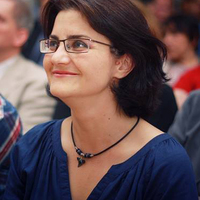Papers by hayk sukiassyan

THE IMPLEMENTATION OF CONSOCIATIONAL STRATEGY IN SOUTH CAUCASUS
LEVON SHIRINYAN
Abstract
The stu... more THE IMPLEMENTATION OF CONSOCIATIONAL STRATEGY IN SOUTH CAUCASUS
LEVON SHIRINYAN
Abstract
The study explores the comprehensive picture of consociational democracy with its regional security component. In post-Soviet South Caucasus, especially in Azerbaijan, Armenia and Georgia under the influence of various factors uncontrolled and hegemonic ethnocratic (Azerbaijan, Georgia) or plutocratic (Armenia) societies emerged instead of genuine democracy. In the course of time it has become apparent that in these societies some theoretical requirements pointed out by Arend Lijphart,viz. the autonomy of segments (in Azerbaijan and Georgia) or specific interests (in Armenia), are ignored. Meanwhile, each of these countries needs coexistence and harmonious development, which are ensured through the implementation of the consociational democracy model.
CONSOCIATIONAL DEMOCRACY IN PLURAL AND UNITARY SOCIETIES
HAYK SUKIASYAN
Abstract
The current view of democracy differs from former classical concepts. The diversity of modern societies and states, complex social stratification, unequal distribution of wealth of the society, the emergence of new classes and segments dramatically change contemporary views and ideas about democracy.
The development of democracy or the search for progress in the society in the context of confrontation is not a productive way. Confrontation between the majority and minority can the victory of one part. However, it may not necessarily be the best part. Sometimes or even often confrontation can lead to the destruction of one of the parts, thus to the upsetting of the balance. The issue is not in opposition but in establishing balance. It is a natural law. Then natural law is the balance. Therefore, restoring the balance is the foundation of democratic development.
In this context, the consociational model of democracy differs favorably due to its functionality.
Most societies, including most post-Soviet societies are plural, and they are characterized by “segment differences”. These differences may be religious, ideological, lingual regional, racial or ethnic characters. Populations, which are separated on this basis, feed by segments of plural society. Such society in general has problems of political stability and of balance between the different segments. The imbalance in favor of one of the ethnic groups inevitably leads to ethnocracy, i.e. to the domination of one ethnic group over other ethnic groups. In plural societies there are two ways for political stability and for balance between different segments of society: the first is federalism, and the second is consociational democracy of Arend Lijphart.
THE NEED FOR CIVIC CULTURE TO IMPLEMENT
CONSOCIATIONAL DEMOCRACY IN
SOUTH CAUCASUS PLURAL STATES
EMIL ORDUKHANYAN
Abstract
The South Caucasus region is quite diverse in its cultural, ethnic, civilization, religious and social structure. At the same time after the collapse of the Soviet Union, emerged numerous internal conflicts significantly hindered the democratization process in the region. The quarter-century post-Soviet experience shows that with some differences mainly pseudo-democratic or even autocratic regimes are established in South Caucasus countries. Many researches affirm that in plural societies of Azerbaijan and Georgia ethnocratic elements are also observed. In these countries the influence of dominant ethnic groups over other ethnicities not explicitly are encouraged by authorities. Local researchers often explain this situation by the transitional period. However, other numerous studies show that in these countries ethnic-based governments aspire to be strengthened. Therefore, these countries could not lead to a fully democratic transition, and in result, they will be able to build ethnic democracies or authoritarian regimes. In this case, the cultural, religious and linguistic identity of subordinate ethnicities will be in danger. To prevent such possible developments, we explore the cultural relativism as opposition to the ethnocentrism. The cultural relativism treats all ethnic segments of the same plural society as equal. And in this case, the most relevant model of democracy can be the consociational model which continues to be successfully used for decades in many plural European states such as Netherlands, Belgium, Northern Ireland etc.
We argue that in South Caucasus plural states the consociational discourse can be a real tool to build a democratic political culture. As a universal objective, the consociational discourse tends to create guarantees of equality and security for all segments in South Caucasus plural states. Only on the base of civic culture development, the consociational democracy model implementation can be efficient.











Uploads
Papers by hayk sukiassyan
LEVON SHIRINYAN
Abstract
The study explores the comprehensive picture of consociational democracy with its regional security component. In post-Soviet South Caucasus, especially in Azerbaijan, Armenia and Georgia under the influence of various factors uncontrolled and hegemonic ethnocratic (Azerbaijan, Georgia) or plutocratic (Armenia) societies emerged instead of genuine democracy. In the course of time it has become apparent that in these societies some theoretical requirements pointed out by Arend Lijphart,viz. the autonomy of segments (in Azerbaijan and Georgia) or specific interests (in Armenia), are ignored. Meanwhile, each of these countries needs coexistence and harmonious development, which are ensured through the implementation of the consociational democracy model.
CONSOCIATIONAL DEMOCRACY IN PLURAL AND UNITARY SOCIETIES
HAYK SUKIASYAN
Abstract
The current view of democracy differs from former classical concepts. The diversity of modern societies and states, complex social stratification, unequal distribution of wealth of the society, the emergence of new classes and segments dramatically change contemporary views and ideas about democracy.
The development of democracy or the search for progress in the society in the context of confrontation is not a productive way. Confrontation between the majority and minority can the victory of one part. However, it may not necessarily be the best part. Sometimes or even often confrontation can lead to the destruction of one of the parts, thus to the upsetting of the balance. The issue is not in opposition but in establishing balance. It is a natural law. Then natural law is the balance. Therefore, restoring the balance is the foundation of democratic development.
In this context, the consociational model of democracy differs favorably due to its functionality.
Most societies, including most post-Soviet societies are plural, and they are characterized by “segment differences”. These differences may be religious, ideological, lingual regional, racial or ethnic characters. Populations, which are separated on this basis, feed by segments of plural society. Such society in general has problems of political stability and of balance between the different segments. The imbalance in favor of one of the ethnic groups inevitably leads to ethnocracy, i.e. to the domination of one ethnic group over other ethnic groups. In plural societies there are two ways for political stability and for balance between different segments of society: the first is federalism, and the second is consociational democracy of Arend Lijphart.
THE NEED FOR CIVIC CULTURE TO IMPLEMENT
CONSOCIATIONAL DEMOCRACY IN
SOUTH CAUCASUS PLURAL STATES
EMIL ORDUKHANYAN
Abstract
The South Caucasus region is quite diverse in its cultural, ethnic, civilization, religious and social structure. At the same time after the collapse of the Soviet Union, emerged numerous internal conflicts significantly hindered the democratization process in the region. The quarter-century post-Soviet experience shows that with some differences mainly pseudo-democratic or even autocratic regimes are established in South Caucasus countries. Many researches affirm that in plural societies of Azerbaijan and Georgia ethnocratic elements are also observed. In these countries the influence of dominant ethnic groups over other ethnicities not explicitly are encouraged by authorities. Local researchers often explain this situation by the transitional period. However, other numerous studies show that in these countries ethnic-based governments aspire to be strengthened. Therefore, these countries could not lead to a fully democratic transition, and in result, they will be able to build ethnic democracies or authoritarian regimes. In this case, the cultural, religious and linguistic identity of subordinate ethnicities will be in danger. To prevent such possible developments, we explore the cultural relativism as opposition to the ethnocentrism. The cultural relativism treats all ethnic segments of the same plural society as equal. And in this case, the most relevant model of democracy can be the consociational model which continues to be successfully used for decades in many plural European states such as Netherlands, Belgium, Northern Ireland etc.
We argue that in South Caucasus plural states the consociational discourse can be a real tool to build a democratic political culture. As a universal objective, the consociational discourse tends to create guarantees of equality and security for all segments in South Caucasus plural states. Only on the base of civic culture development, the consociational democracy model implementation can be efficient.
LEVON SHIRINYAN
Abstract
The study explores the comprehensive picture of consociational democracy with its regional security component. In post-Soviet South Caucasus, especially in Azerbaijan, Armenia and Georgia under the influence of various factors uncontrolled and hegemonic ethnocratic (Azerbaijan, Georgia) or plutocratic (Armenia) societies emerged instead of genuine democracy. In the course of time it has become apparent that in these societies some theoretical requirements pointed out by Arend Lijphart,viz. the autonomy of segments (in Azerbaijan and Georgia) or specific interests (in Armenia), are ignored. Meanwhile, each of these countries needs coexistence and harmonious development, which are ensured through the implementation of the consociational democracy model.
CONSOCIATIONAL DEMOCRACY IN PLURAL AND UNITARY SOCIETIES
HAYK SUKIASYAN
Abstract
The current view of democracy differs from former classical concepts. The diversity of modern societies and states, complex social stratification, unequal distribution of wealth of the society, the emergence of new classes and segments dramatically change contemporary views and ideas about democracy.
The development of democracy or the search for progress in the society in the context of confrontation is not a productive way. Confrontation between the majority and minority can the victory of one part. However, it may not necessarily be the best part. Sometimes or even often confrontation can lead to the destruction of one of the parts, thus to the upsetting of the balance. The issue is not in opposition but in establishing balance. It is a natural law. Then natural law is the balance. Therefore, restoring the balance is the foundation of democratic development.
In this context, the consociational model of democracy differs favorably due to its functionality.
Most societies, including most post-Soviet societies are plural, and they are characterized by “segment differences”. These differences may be religious, ideological, lingual regional, racial or ethnic characters. Populations, which are separated on this basis, feed by segments of plural society. Such society in general has problems of political stability and of balance between the different segments. The imbalance in favor of one of the ethnic groups inevitably leads to ethnocracy, i.e. to the domination of one ethnic group over other ethnic groups. In plural societies there are two ways for political stability and for balance between different segments of society: the first is federalism, and the second is consociational democracy of Arend Lijphart.
THE NEED FOR CIVIC CULTURE TO IMPLEMENT
CONSOCIATIONAL DEMOCRACY IN
SOUTH CAUCASUS PLURAL STATES
EMIL ORDUKHANYAN
Abstract
The South Caucasus region is quite diverse in its cultural, ethnic, civilization, religious and social structure. At the same time after the collapse of the Soviet Union, emerged numerous internal conflicts significantly hindered the democratization process in the region. The quarter-century post-Soviet experience shows that with some differences mainly pseudo-democratic or even autocratic regimes are established in South Caucasus countries. Many researches affirm that in plural societies of Azerbaijan and Georgia ethnocratic elements are also observed. In these countries the influence of dominant ethnic groups over other ethnicities not explicitly are encouraged by authorities. Local researchers often explain this situation by the transitional period. However, other numerous studies show that in these countries ethnic-based governments aspire to be strengthened. Therefore, these countries could not lead to a fully democratic transition, and in result, they will be able to build ethnic democracies or authoritarian regimes. In this case, the cultural, religious and linguistic identity of subordinate ethnicities will be in danger. To prevent such possible developments, we explore the cultural relativism as opposition to the ethnocentrism. The cultural relativism treats all ethnic segments of the same plural society as equal. And in this case, the most relevant model of democracy can be the consociational model which continues to be successfully used for decades in many plural European states such as Netherlands, Belgium, Northern Ireland etc.
We argue that in South Caucasus plural states the consociational discourse can be a real tool to build a democratic political culture. As a universal objective, the consociational discourse tends to create guarantees of equality and security for all segments in South Caucasus plural states. Only on the base of civic culture development, the consociational democracy model implementation can be efficient.